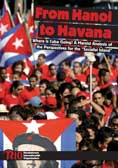




 Cuba’s joint ventures are run primarily by the Revolutionary Armed Forces (FAR). The long-time leader of the FAR and now prime minister of the island, Raúl Castro, has been considered a “reformer” since the 1980s. Military companies are now the largest partner of foreign capital in Cuba, controlling some 40% of GDP: the tourism holding company Gaviota S.A., owned by the FAR, is one of the largest companies on the island[33].
Cuba’s joint ventures are run primarily by the Revolutionary Armed Forces (FAR). The long-time leader of the FAR and now prime minister of the island, Raúl Castro, has been considered a “reformer” since the 1980s. Military companies are now the largest partner of foreign capital in Cuba, controlling some 40% of GDP: the tourism holding company Gaviota S.A., owned by the FAR, is one of the largest companies on the island[33].
The existence of private companies has led to extensive corruption at all levels of the Cuban system: from local inspectors taking bribes from small businesses to generals taking kick-backs while negotiating multi-million dollar deals with international tourism corporations. From a Marxist perspective, the most dangerous development consists of cracks in the state monopoly on foreign trade. For example, joint ventures can import goods themselves, bypassing the Cuban economic plan. A group of Cuban economists determined as early as 1995: “The activity of foreign trade, formerly totally controlled by the Ministry of Foreign Trade, has been taken over directly by a growing number of businesses (belonging to state organisms, trading societies belonging to Cuban capital, joint ventures and representatives of foreign companies.”[34]
The ruling party, the Cuban Communist Party (PCC), was not founded until six years after the revolution – and didn’t hold its first congress until six years after that. The PCC was not, before the “institutionalization” of the revolution in the 1970s, the central political apparatus on the island, a role reserved for the armed forces. Now the political system is based on a balance of power between the (often overlapping) party and military bureaucracies. Precisely in the difficult times of the “special period”, the PCC grew dramatically: at its fifth congress in 1997, the party had 780,000 members, a third of whom joined after 1990[35]. It was in this context that it re-defined itself from the “single party of the Cuban workers” to the “single party of the Cuban nation” and replaced Marxism-Leninism with Cuban nationalism as its guiding ideology[36].
Recent years have also seen a certain increase in democratic freedoms. There is less press censorship, more discussion at the universities, an openness to LGBT rights – it is even possible to buy works by Leon Trotsky at the International Book Fair in Havana[37]! But this is primarily an expression of market reforms, not of socialist democracy. A bourgeois economic system requires a certain amount of public discourse to regulate itself via mechanisms of supply and demand.
Notes:
33. Brenner: Cuba Reader. P. 48.
34. Quoted in: Hernández: “Cuba … no es una isla”. P. 110.
35. LeoGrande: “Single Party”. P. 191.
36. Ebd. P. 184-185.
37. This is not a sign that the Cuban government is open to the revolutionary ideas of Leon Trotsky, but rather that they are not currently worried about a workers’ revolution on the island.
Leave a Reply
